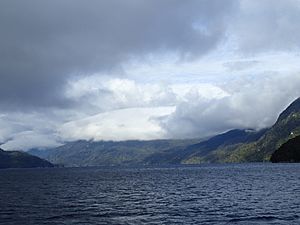Rakituma / Preservation Inlet facts for kids
Rakituma / Preservation Inlet is the southernmost fiord in Fiordland National Park. It sits on the southwest corner of the South Island of New Zealand. A fiord is a long, narrow, deep inlet of the sea, formed by a glacier.
Contents
Exploring Rakituma / Preservation Inlet
Rakituma / Preservation Inlet is a long, narrow fiord. It stretches towards the northeast. At its entrance, you'll find Coal Island. The deepest part of the inlet is called Long Sound. This area is where the Long Burn river flows out. The Gray River also flows near the inlet.
A big part of this area is protected. It's called the Te Tapuwae o Hua (Long Sound) Marine Reserve. This reserve helps keep the marine life safe.
A Glimpse into History
People have known about Rakituma / Preservation Inlet for a long time. Early sealers and whalers visited it. Captain Eber Bunker named the inlet in 1809.
New Zealand's first shore-based whaling station was built here. Captain Peter Williams set it up in 1828 or 1829. They hunted southern right whales in the area.
In the 1890s, people found gold here. Two small towns, Cromarty and Te Oneroa, grew in Kisbee Bay for the miners. By 1904, most miners had left. Today, only a few signs of these towns remain.
The name of the inlet was officially changed in October 2019. It became Rakituma / Preservation Inlet.
Amazing Wildlife of the Inlet
This fiord is home to many interesting animals.
Marine Mammals
For many years, southern right whales were heavily hunted. Now, they are slowly returning to the inlet. You might also spot Hector's dolphins here. Bottlenose dolphins are seen more often.
Sometimes, large Southern elephant seals are seen resting on the shores. They come to relax around the inlet.
How to Visit Rakituma / Preservation Inlet
There are no roads that go directly to the coast here. But you can reach the inlet by tramping (hiking). There is a track from Tuatapere.
You can also get to the fiord by boat. Another way to arrive is by air, using a plane or helicopter.
 | Mary Eliza Mahoney |
 | Susie King Taylor |
 | Ida Gray |
 | Eliza Ann Grier |


